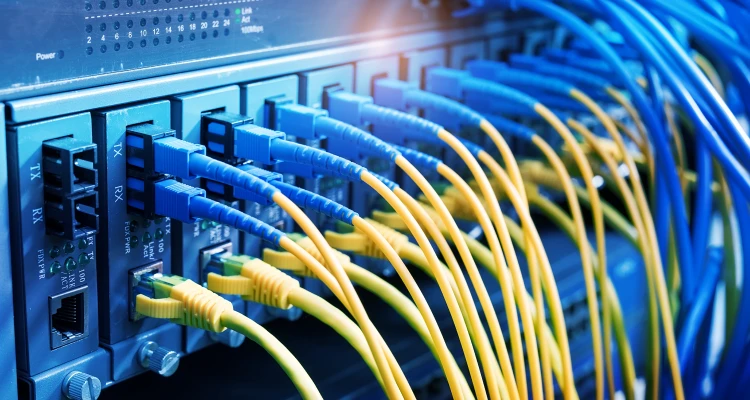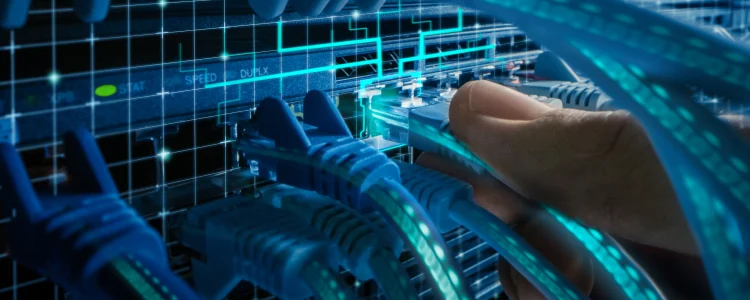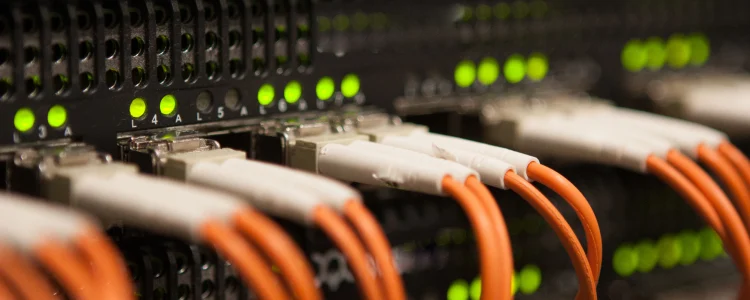How to Choose the Best Network Switch

Choosing the best network switch is an incredibly important decision for any business, as it makes a massive impact on your network infrastructure. They’re responsible for connecting various devices within your network to communicate efficiently. Each device on the network connects to the switch, which manages data traffic and ensures it gets to the correct destination.
Choosing the right network switch is essential for maintaining a high-performance network that meets your business’s needs. The wrong switch can lead to bottlenecks, security vulnerabilities, and costly downtime, hindering your company’s productivity and growth. We here at ServerMania know how essential this choice can be, with over 20 years of experience serving our customers.
In this article, we’ll explain some of the different types of network switches available, what you should look for when choosing a network switch, and what types of switches suit different business sizes and needs.

Different Types of Network Switches
Selecting the right network switch for your company can significantly impact your server infrastructure (and its overall efficiency). Understanding the different types available will help make sure that all your network devices and operations run smoothly. Let’s explore the main types of network switches and how they differ from each other.
Modular
Modular switches offer a high level of customization, making them ideal when you need to remain flexible as network requirements change. These switches allow you to add or remove modules, such as additional ethernet ports or advanced functionality, so you can adapt to changing network demands. Modular switches are your best network switch if you anticipate significant growth or need a highly customizable option.
Fixed
Fixed switches are a more straightforward, cost-effective, solution for networks that have stable and predictable demands. These network switches come with a set number of ports and fixed hardware configurations, offering reliable performance without the need for additional customization. While they lack the flexibility of modular switches, the option of having an easy-to-use and lower cost switch can make the difference for some businesses.
Unmanaged
Unmanaged switches are the simplest, and most cost-effective option, designed for basic network connectivity. They’re typically used in a home network or small office network. There isn’t usually any configuration required and lack an advanced feature set, but are reliable and come in at a low cost.
Managed
Managed switches offer the most control over your network, typically offering a feature set that includes Quality of Service (QoS), VLAN support, and Simple Network Management Protocol (SNMP) monitoring. They’re one of the best network switches for businesses that need high levels of security, traffic management features, and network segmentation. With a managed switch, you can optimize network performance and ensure that critical services always get the necessary bandwidth.
See also: How do private switches work in a server cluster?
Smart
A smart switch is a great middle-ground between unmanaged switches and a fully managed switch. They offer some level of configurability and control, like VLAN support and QoS settings, but without the complexity associated with fully managed switches. This makes them a great choice for those looking for a middle-ground, offering more control than an unmanaged switch but easier to set up than a managed one.
See also: Hyper-V Networking: what are the different switches used for?

So, How Do You Choose a Network Switch?
Trying to find the best network switches that fit your needs is a big decision. The wrong network switch can severely impact your infrastructure’s efficiency and scalability, which can spell disaster for some companies. So, when you’re weighing your options to find the best network switches, ask yourself these questions:
How many ports do you need (and how fast do they need to be?)
It all starts with knowing how many connected devices your network switch needs to support. This could include computers, servers, wireless devices, IoT devices, and even wired devices like Wi-Fi routers. Figuring out how many ethernet ports you may need in the future can save you time and money.
Speed is another important factor for picking a network switch. If your network handles large files, video streaming, or heavy data traffic, options that include a gigabit ethernet switch is almost mandatory. Some high-performance environments may need to go a step further and look for a network switch that offers 10 gigabit ethernet ports.
What type of switch suits my use case?
Different network environments require different types of switches. For small office setups, an unmanaged switch might suffice, offering simplicity and ease of use with a plug-and-play setup. On the other hand, larger enterprises may need modular or fully managed switches to handle complex traffic management and provide the flexibility to scale as the network grows.
For businesses with mid-level requirements, a smart switch supports a balanced approach with some level of control without the complexity of a fully managed switch. Meanwhile, modular switches are the best for large enterprises or data centers, offering flexibility through customization that can upgrade your network as needed.
Do I need Power over Ethernet (PoE)?
Power over Ethernet is an important feature for networks that power devices like IP cameras, VoIP phones, or wireless access points directly through Ethernet cables. This eliminates the need for separate power sources, simplifying installation and reducing the number of cables required.
Factor in whether or not your network needs PoE ports when making decisions. For example, large offices that have multiple wireless access points, PoE can simplify network setup and maintenance. PoE can also be a great help in situations where power outlets are scarce or difficult to install.
Is it Scalable?
Whether you’re growing your startup or scaling up your operations, scalability is a crucial factor when picking network switches.
Modular switches provide the greatest flexibility, allowing you to add more ports or upgrade features without replacing the entire switch. Even with fixed switches, look for models that support stacking, where multiple switches can be connected and managed as a single unit. This allows your network to grow with your business, ensuring you’re not left with outdated infrastructure as your needs evolve.
When choosing a switch, make sure you’re accounting for both your current requirements and your future needs. Investing in a scalable solution today can save you significant time and costs down the line when you need to upgrade.
See also: Server Cluster Hosting
What about Quality of Service (QoS) Features?
Quality of Service (QoS) is essential in environments where different types of data—such as voice, video, and regular data, compete for bandwidth. QoS allows you to prioritize network traffic, ensuring critical services like VoIP or video conferencing have the bandwidth they need to operate smoothly, even during peak usage times.
Switches with powerful QoS features allow you to allocate bandwidth effectively, ensuring that critical applications run smoothly across your network. Businesses that rely on applications requiring consistent and reliable performance benefit the most from network switches that offer QoS features.
Does it offer security features?
Network security is a high priority for any business, especially with 75% of security professionals seeing an uptick in attacks in 2023. Managed switches typically come with advanced security features like Access Control Lists (ACLs), 802.1x authentication, and VLAN support. These features help you protect your network from unauthorized access and potential cyber threats, ensuring that your sensitive data remains secure.
When you’re considering switches, check whether or not the security features they offer meet your company’s standards. If your business handles sensitive information or operates in a regulated industry, strong security features within your network switch are an essential requirement.
Is it energy efficient?
Energy saving features are more important now than ever before. It’s more than simply shaving costs, it’s a key component of corporate responsibility (and an ethically responsible choice).
Look for switches that supports Energy Efficient Ethernet (EEE) or are certified by programs like ENERGY STAR. These switches reduce power consumption during periods of low network activity, which can make a difference in large-scale deployments where energy use is a significant concern, such as with crypto servers.

Network Switches for Different Needs
When it comes to choosing the best network switch for your business, matching your selection to your requirements is the most important step you can take. Spending too much (or too little) on a switch that doesn’t fit your needs can easily spiral into a major problem.
Small to Medium-Sized Businesses
For small and medium-sized businesses (SMBs), simplicity and cost-effectiveness are often top priorities. These businesses typically require switches that are easy to set up and manage, with enough ports to support multiple devices.
Unmanaged switches or smart switches are popular choices for these sizes, offering a balance of accessibility and basic configuration options. These switches are great for offices with limited IT staff, providing reliable connectivity without the need for complex management.
SMBs should prioritize switches that are easy to deploy and manage, while still providing sufficient performance for day-to-day operations. With growth in mind, opting for a switch with a few more ethernet ports can be a wise move for the future.
Enterprise-Grade Solutions
Enterprise environments demand more solid and scalable networking solutions to handle large volumes of traffic and ensure network reliability. These are significantly higher than SMBs, requiring more advanced features and greater capacity.
Managed switches are the go-to option for enterprises, offering key features like VLAN support, QoS, and better security protocols. These switches are designed for large networks with multiple segments and high-performance requirements. Options that include gigabit speeds and failover capabilities can also make a difference in your network.
Enterprises may also want to consider modular switches that provide the flexibility to add or upgrade components as needed, ensuring your network can scale with your growth.
Home Network Options
Naturally, home networks lack most of the needs that a business may offer, but many homes and small businesses need network switches to power devices like home security or home office needs.
For most homes, basic unmanaged switches are ideal due to their simplicity and plug and play functionality. More advanced users may want to look at managed switches for greater control, with features like network monitoring. Security cameras, home IoT devices, and other items around the house may also benefit from a PoE enabled switch.
Finally, if gaming, 4k streaming, or running homelab servers, aim for network switches that offer gigabit ethernet and QoS to ensure smooth, lag-free performance.
Specialized Use Cases
Certain industries or applications might have unique network requirements that a traditional network switch might not be able to meet effectively. This can include environments like data centers, gaming servers, VoIP-heavy networks, or large-scale Internet of Things (IoT) deployments.
For example, businesses operating gaming servers need switches with low latency and high throughput to ensure a seamless gaming experience. Network switches that include advanced QoS features are essential to prioritize gaming traffic, minimizing lag and providing a smooth experience.
Similarly, businesses that are involved in blockchain technology often have high network demands that need to be met, with constant data flow and the need for reliable, 24/7 uptime. For these applications, managed switches with strong security features and redundancy capabilities are essential to protect sensitive data and ensure network resilience against potential failures.
Alternatively, for other specialized needs like industrial environments, industrial switches are designed to withstand harsher conditions, including extreme temperatures, dust, and moisture. These are ideal for manufacturing plants, outdoor installations, or anywhere that your traditional switch might not survive.
For these cases, working with trusted vendors can help point you in the right direction to find something suitable for your needs.
Make The Right Choice For Your Needs
Choosing the right network switch is an incredibly important decision for building a reliable and efficient server infrastructure. Whether you’re running a small business, managing a large enterprise, or handling specialized tasks, the switch you select directly impacts your network’s performance, scalability, and security.
Making an informed choice ensures your network infrastructure can support current demands alongside future growth. Additionally, investing the time to understand your options and working with vendors can save you from potential headaches down the line, while keeping your business running smoothly.
ServerMania has been a leader in the industry for over 20 years, helping their customers get the most out of their networks. Whether you’re supporting your small office or expanding to enterprise-level hosting, we’ve got your back. Check out our dedicated servers or contact us for a quote.
Was this page helpful?

